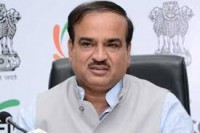
Cement Industry is one of the essential sectors for economic growth pivotal for the growth of other social, agricultural and industrial activities. The government’s focus on building infrastructure will support in translating into double digit growth for demand for cement as various schemes and initiatives announced by the government gather steam, said Chaudhary Birender Singh, Hon’ble Minister of Rural Development. Shri Singh was speaking at the Inaugural Session of the Indian Cement Conference 2015 – “Make in India – Urban Infrastructure & Smart Cities” organised by Confederation of Indian Industry (CII) in New Delhi .
While highlighting the various opportunities for the industry supported by the changing consumption pattern in rural and urban areas and the recent initiatives taken by the government to stimulate infrastructure, construction and residential sectors, the Minister shared the government ‘s plans to support the rural development like raising the amount under Indira Aawas Yojana (AAY) from current Rs 70,000 to Rs 1,50,000 and dove-tailing the benefits of MGNREGA into the rural housing scheme which will further raise the demand for cement. He added that a consolidated procurement model could be effective in reducing overall costs. The Minister underlined that cement intrinsically provides quality and durability and emphasised the need for adopting green and cost effective technologies.
Stressing that skill development and training remain crucial areas for attention, the Minister urged the industry to invest a portion of their CSR funds towards skill development initiatives in the construction sector. The Minister informed that while the government is focusing on developing skills and productive capacity of the rural youth from poor families through Deen Dayal Upadhyaya Grameen Kaushalya Yojana (DDU-GKY), he also asked the industry to support the government to develop requisite skills for construction etc. in the rural areas. To support the government’s vision of providing housing for all, he urged the corporates to sponsor few gram panchayats in constructing houses for the beneficiaries of the government schemes.
Speaking at the session, Mr Shailendra Singh, Joint Secretary, Department for Industrial Policy and Promotion (DIPP), Ministry of Commerce & Industry, said that the Government is committed on creating an enabling environment for the industry. The efforts of the Government’s initiatives in this direction are clearly visible in the recent improvements in the World Bank’s ease of doing business rankings. The 12-point improvement in rating represents the first time that India has made such significant progress. With the view to bring improvements in investment climate and foster competition among states, the Government has introduced state ranking on ease of doing business in states, said Mr Singh. Stressing on the need for sustainability issues w.r.t. the cement industry, he highlighted the need for adopting the global standards in production process, treating waste and effluents and maintaining environmental standards.
Presenting his perspective, Mr Mahendra Singhi, Group Executive Officer, Dalmia Cement (Bharat) Ltd said that sustainable growth would be key for supporting the aspirations of faster and inclusive growth. To support this faster and quality growth, the Industry will need to focus on newer technological solutions for bringing cost effective and green solutions in the construction process. Stressing that smart cities was not a plan but a necessity, he underlined the need for “Smart Towns” and “Smart Villages” for supporting the inclusive growth agenda of the country.
Earlier in the session, Mr Ajay Kapur, Chairman, CII Cement Industry Division and Managing Director & CEO, Ambuja Cements Ltd, said that the cement industry is the perfect example of Make in India, as we have emerged as a country from a cement deficit stage in the 1970s to a cement surplus one in the 1990s. He also added that we were today a net exporter. Further, the government’s efforts on infrastructure development provide huge opportunities for the sector. However, to support sustainable development and growth, the sector will need to go an extra mile said the Chairman. For the industry to realise its true potential, he stressed on the need for addressing the challenges like high rail freight, revisiting new emission norms, strengthening coal linkages, improving the thermal substitution rate, adopting the concept of ready mix concrete to add value to concrete, improving the slag utilization rates through blending and composite cement products etc.
Presenting his vote of thanks and concluding remarks, Mr Atul Desai, Executive Director and Chief Marketing officer, Reliance Cement Ltd, said that the sector holds tremendous growth potential and stressed on the need for solving the remaining issues before the sector to fully support the Make in India initiative.






Leave a Reply
You must be logged in to post a comment.